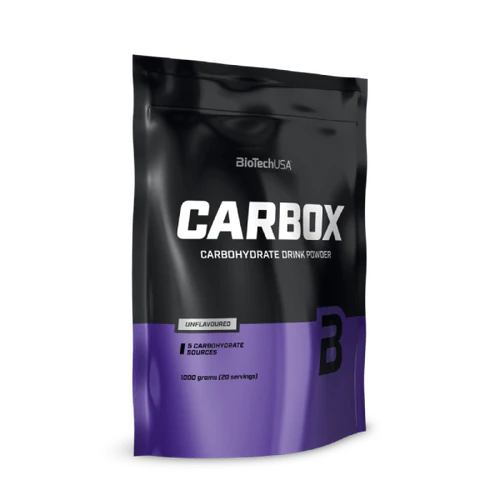Fructose
Filters
-
 Save 11%
Save %
Original price €10,90Original price €10,90 - Original price €10,90Original price €10,90Current price €9,70€9,70 - €9,70Current price €9,70| /
Save 11%
Save %
Original price €10,90Original price €10,90 - Original price €10,90Original price €10,90Current price €9,70€9,70 - €9,70Current price €9,70| /CarboX · 1000g
Biotech USA1 reviewBiotech CarboX™ is a complex carbohydrate formula with delayed release Contains various forms of slow, normal and fast absorbing carbohydrates Als...
View full detailsOriginal price €10,90Original price €10,90 - Original price €10,90Original price €10,90Current price €9,70€9,70 - €9,70Current price €9,70| /Save 11% Save %
Alongside glucose, fructose - which is also known as fruit sugar - is one of the two main components of household sugar. As the name suggests, fructose is also found in variable proportions in most types of fruit. Although fructose has little effect on blood sugar levels and insulin secretion, some experts believe that fructose is even worse than glucose - at least when consumed in excessive amounts.
What is fructose?
Fructose is a simple sugar that makes up 50% of household sugar (sucrose). Simple sugar is a disaccharide consisting of one molecule of glucose and one molecule of fructose. While glucose can be used directly by the body, fructose must first be converted into glucose in the liver before it can be used as an energy source by the body's cells.
Fructose is also found in various sugary sweeteners such as high-fructose corn syrup and agave syrup. If you find fructose high up on the list of ingredients in a product, you can be sure that this product is rich in fructose. Before the mass production of refined sugar began, humans rarely consumed large amounts of fructose. Even though sweet fruits and some vegetables contain fructose, these are rarely large amounts.
Some people do not absorb all the fructose they consume. This disorder is also known as fructose malabsorption and is associated with bloating and digestive discomfort (1). In people suffering from fructose malabsorption, fructose acts as a fermentable carbohydrate and is categorized as a FODMAP (2).
Unlike glucose, fructose causes only a slight increase in blood sugar levels. For this reason, doctors and health experts have in the past recommended fructose as a "safe" sugar alternative for people suffering from type 2 diabetes (3). Today, however, it is suspected that fructose may contribute to various metabolic disorders.
- Summary: Fructose is a type of sugar that makes up 50% of table sugar. Scientists suspect that excessive consumption of fructose can cause metabolic disorders.
Why is fructose bad for the body?
Glucose and fructose are metabolized very differently by the human body. While every cell in the body can use glucose, the liver is the only organ in the human body that can metabolize fructose in significant amounts. When people follow a diet that is high in calories and fructose, the liver becomes overloaded and begins to metabolize fructose into fat.
Many scientists believe that excessive fructose consumption may be a key factor in many diseases, including obesity, type 2 diabetes, heart disease and others. More research is needed to make definitive statements. At this time, scientists are debating the extent to which fructose contributes to these diseases (4). Summary: Many health experts believe that excessive fructose consumption is one of the main causes of metabolic disorders.
The harmful effects of excessive fructose
Although excessive amounts of fructose are undoubtedly unhealthy, the effects on health are controversial. However, there is a sufficient amount of evidence to warrant health concerns.
According to studies, high fructose consumption can have the following effects:
- Negative changes in blood lipid levels: fructose can increase VLDL cholesterol levels, promote an accumulation of fat around the organs and potentially increase the risk of heart disease (5, 6).
- An increase in uric acid levels in the blood, which can lead to gout and high blood pressure (7).
- Fat deposits in the liver, which can potentially lead to non-alcoholic fatty liver disease (8, 9).
- Promotion of insulin resistance, which can lead to obesity and type 2 diabetes (10).
- Fructose does not suppress appetite as much as glucose. As a result, it can promote overeating (11).
- Excessive fructose consumption can cause leptin resistance, disrupt body fat regulation and contribute to obesity (12, 13).
Not all of this has been proven beyond a shadow of a doubt in controlled studies. However, there is strong evidence and future studies will show a clearer picture of the exact relationships.
Summary: Many studies suggest that high fructose intake may contribute to chronic disease in humans.
Fructose in the form of added sugar is bad, but this does not apply to fruit. It is important to realize that none of this applies to fruit itself. Fruit is not only a high water source of fructose, but real food with a low calorie density and a lot of fiber. It is very difficult to consume an excessive amount of calories from fruit alone and you would have to eat enormous amounts of fruit to reach harmful levels of fructose. In general, fruit is a minor source of fructose compared to added sugar. The harmful effects of fructose apply to the typical Western diet, which provides excess amounts of calories and added sugars. They do not apply to natural sugars found in fruits and vegetables.
References:
- https://www.ncbi.nlm.nih.gov/pubmed/26883354
- https://www.ncbi.nlm.nih.gov/pubmed/24357350
- https://www.ncbi.nlm.nih.gov/pubmed/22723585
- https://www.ncbi.nlm.nih.gov/pubmed/28878197
- https://www.ncbi.nlm.nih.gov/pmc/articles/PMC2673878/
- https://www.ncbi.nlm.nih.gov/pubmed/19403641
- https://www.ncbi.nlm.nih.gov/pubmed/16234313
- https://www.sciencedirect.com/science/article/abs/pii/S0168827808001645
- https://www.ncbi.nlm.nih.gov/pubmed/28273805
- https://www.ncbi.nlm.nih.gov/pubmed/27194405/
- https://www.ncbi.nlm.nih.gov/pubmed/23280226
- https://www.ncbi.nlm.nih.gov/pubmed/18703413
- https://www.ncbi.nlm.nih.gov/pubmed/21418711

